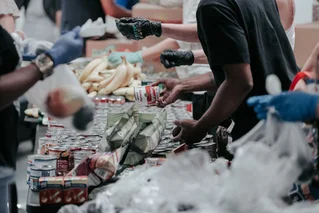
How to Donate Food and Prevent Food Waste
One way to tackle the food waste problem and a hunger crisis simultaneously is to ensure that food that would otherwise go to waste feeds the hungry.
The U.S. has a massive food waste problem and a hunger crisis. These issues seem contradictory, but the improper distribution of food creates both. One way to tackle these challenges simultaneously is to ensure that food that would otherwise go to waste feeds the hungry.
Donating would-be wasted food is a key exception to our recommended best practice: give money, not food, to food banks. Giving cash donations to food banks is always preferable for several reasons:
Food banks can use money to buy food in bulk.
Cash funds also give food banks flexibility to buy what they need when needed.
Food banks have the experience to know which products will best serve their communities.
When food is in excess, donating is a great way to contribute to the community while preventing waste. Happily, food donations made in good faith are federally protected, so you should not worry about the potential consequences of donating food you believe is safe to consume.
Steps for Donating Food:
Judge your donation with a strict eye. Is the food edible and acceptable for consumption, and will it still be when it gets into the hands of someone in need? If the food is simply too much for you to eat before it expires or unsuitable due to your dietary restrictions, it is likely a good candidate. If the food is expired or compromised, it is best to throw it out (or compost it, if possible) rather than burden a charity with a donation that will only create more work. Your state may have laws dictating food donation that can help guide your decision.
Find a local service that can benefit from your donation. Not all food banks or other services accept all types of food donations. Many organizations have requirements for their donations, including factors like shelf stability. You can use Charity Navigator’s search to find organizations in your area that may be good candidates for your donation. Once you have found a charity you would be interested in supporting, go to their website and find out their donation requirements. If your donation does not fit the bill, move on to another option. If you are unsure, contact the organization to clarify before dropping off your donation.
Make your donation as quickly as is reasonable. The closer your food is to the expiration date, the more urgent it is to get your donation to the charity. Once you have established that your food donation is a fit, do not delay. Find out when the charity accepts donations and make a plan to deliver your food as soon as you can within that window. In some areas, services may exist to facilitate the pickup of large food donations.


